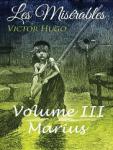Book 7 - Patron Minette
Chapter 4 - Composition Of The Troupe
These four ruffians formed a sort of Proteus, winding like a serpent among the police, and striving to escape Vidocq's indiscreet glances "under divers forms, tree, flame, fountain," lending each other their names and their traps, hiding in their own shadows, boxes with secret compartments and refuges for each other, stripping off their personalities, as one removes his false nose at a masked ball, sometimes simplifying matters to the point of consisting of but one individual, sometimes multiplying themselves to such a point that Coco-Latour himself took them for a whole throng.
These four men were not four men; they were a sort of mysterious robber with four heads, operating on a grand scale on Paris; they were that monstrous polyp of evil, which inhabits the crypt of society.
Thanks to their ramifications, and to the network underlying their relations, Babet, Gueulemer, Claquesous, and Montparnasse were charged with the general enterprise of the ambushes of the department of the Seine. The inventors of ideas of that nature, men with nocturnal imaginations, applied to them to have their ideas executed. They furnished the canvas to the four rascals, and the latter undertook the preparation of the scenery. They labored at the stage setting. They were always in a condition to lend a force proportioned and suitable to all crimes which demanded a lift of the shoulder, and which were sufficiently lucrative. When a crime was in quest of arms, they under-let their accomplices. They kept a troupe of actors of the shadows at the disposition of all underground tragedies.
They were in the habit of assembling at nightfall, the hour when they woke up, on the plains which adjoin the Salpetriere. There they held their conferences. They had twelve black hours before them; they regulated their employment accordingly.
Patron-Minette,--such was the name which was bestowed in the subterranean circulation on the association of these four men. In the fantastic, ancient, popular parlance, which is vanishing day by day, Patron-Minette signifies the morning, the same as entre chien et loup--between dog and wolf--signifies the evening. This appellation, Patron-Minette, was probably derived from the hour at which their work ended, the dawn being the vanishing moment for phantoms and for the separation of ruffians. These four men were known under this title. When the President of the Assizes visited Lacenaire in his prison, and questioned him concerning a misdeed which Lacenaire denied, "Who did it?" demanded the President. Lacenaire made this response, enigmatical so far as the magistrate was concerned, but clear to the police: "Perhaps it was Patron-Minette."
A piece can sometimes be divined on the enunciation of the personages; in the same manner a band can almost be judged from the list of ruffians composing it. Here are the appellations to which the principal members of Patron-Minette answered,--for the names have survived in special memoirs.
Panchaud, alias Printanier, alias Bigrenaille.
Brujon. [There was a Brujon dynasty; we cannot refrain from interpolating this word.
Boulatruelle, the road-mender already introduced.
Laveuve.
Finistere.
Homere-Hogu, a negro.
Mardisoir. (Tuesday evening.)
Depeche. (Make haste.)
Fauntleroy, alias Bouquetiere (the Flower Girl).
Glorieux, a discharged convict.
Barrecarrosse (Stop-carriage), called Monsieur Dupont.
L'Esplanade-du-Sud.
Poussagrive.
Carmagnolet.
Kruideniers, called Bizarro.
Mangedentelle. (Lace-eater.)
Les-pieds-en-l'Air. (Feet in the air.)
Demi-Liard, called Deux-Milliards.
Etc., etc.
We pass over some, and not the worst of them. These names have faces attached. They do not express merely beings, but species. Each one of these names corresponds to a variety of those misshapen fungi from the under side of civilization.
Those beings, who were not very lavish with their countenances, were not among the men whom one sees passing along the streets. Fatigued by the wild nights which they passed, they went off by day to sleep, sometimes in the lime-kilns, sometimes in the abandoned quarries of Montmatre or Montrouge, sometimes in the sewers. They ran to earth.
What became of these men? They still exist. They have always existed. Horace speaks of them: Ambubaiarum collegia, pharmacopolae, mendici, mimae; and so long as society remains what it is, they will remain what they are. Beneath the obscure roof of their cavern, they are continually born again from the social ooze. They return, spectres, but always identical; only, they no longer bear the same names and they are no longer in the same skins. The individuals extirpated, the tribe subsists.
They always have the same faculties. From the vagrant to the tramp, the race is maintained in its purity. They divine purses in pockets, they scent out watches in fobs. Gold and silver possess an odor for them. There exist ingenuous bourgeois, of whom it might be said, that they have a "stealable" air. These men patiently pursue these bourgeois. They experience the quivers of a spider at the passage of a stranger or of a man from the country.
These men are terrible, when one encounters them, or catches a glimpse of them, towards midnight, on a deserted boulevard. They do not seem to be men but forms composed of living mists; one would say that they habitually constitute one mass with the shadows, that they are in no wise distinct from them, that they possess no other soul than the darkness, and that it is only momentarily and for the purpose of living for a few minutes a monstrous life, that they have separated from the night.
What is necessary to cause these spectres to vanish? Light. Light in floods. Not a single bat can resist the dawn. Light up society from below.
